Las Chavas
Edited by Spencer Reece and Richard Blanco
A call can come from unlikely places.
I was a new priest. For one year I taught English and celebrated the Eucharist at Our Little Roses, the only all-girl orphanage in a country with 180,000 orphans. I came on a Fulbright grant with the aim of collecting poems by the girls to later publish in a book.
Our Little Roses has been in existence for over twenty-five years and has fostered and supported girls to become self-sufficient professionals. Before the orphanage was founded, girl orphans in Honduras, if they did not go immediately into servitude or prostitution, were taken to the women’s penitentiary where inmates would care for them. Adoption has been discouraged for years because Honduras found too many girls showing up in the sex trade in the United States. The goal of Our Little Roses is for the girls to keep Honduras as their home.
I’d first arrived in Honduras a few years earlier, for one summer, to learn Spanish. I was late to Spanish. I had a desire to learn it because I had been working as a chaplain at Hartford Hospital in Connecticut, where many patients solely spoke Spanish. One night, I had been paged to the emergency room where a teenage boy had been stabbed multiple times in the chest. I was to provide pastoral care for the mother, who did not speak English. The boy died by the morning. Unable to communicate with the mother in her grief, I felt like a fraud. Pink dawn rising, I called my bishop in Miami from a little antiseptic family room in the hospital and said, “I must learn Spanish.” He said: “I have just the place for you.”
I am a priest in the Episcopal church, a part of the Anglican Communion. Anglicans are not known for their inroads into Latin America. Yet, it just so happened that my bishop had navigated both Latin and Anglican worlds his entire life. Leo Frade had been the Bishop of Honduras for seventeen years before being called to the episcopate in Miami. I went through the process of Holy Orders in his diocese. Dr. Diana Frade, his wife, had founded the orphanage.
At first, I did not learn much Spanish. Completely out of place, a fifty-year-old, childless man with seventy-two girls, and unable to communicate, I often wondered what on Earth I was doing there that first summer. The night before I left, a girl waited for me at the bottom of the stairs. “What are you doing here?” I asked. She paused for a long time. “Is there something you want to tell me?” Another pause, then she said, “Don’t forget us.” Three words. They changed everything.
Her request lodged in me deep. Maybe she said it to everyone? In my case, she bade me welcome. Two years later, I returned to teach poetry. I began classes the day Richard Blanco delivered his poem before the world at President Obama’s second inauguration. Together, the girls and I watched him read the poem before our electricity went out. I told them he would be coming to meet them. The girls were clearly dubious. Hondurans have been promised so many extravagant things by gringos that they usually do not believe any of it. However, eleven months later, Richard arrived. In addition to coediting this portfolio, in my penultimate week, he helped the seventh grade class write the final poem you’ll find here.
The girls and I worked closely. I had them memorize poems in English to help them improve their English and their understanding of English poetry and meter: Psalm 23 and Gerard Manley Hopkins, among others. They kept diaries. They did reports on poets such as Sylvia Plath and W.H. Auden. Local poets came to the class to meet them. They wrote their own poems: sometimes in Spanish, sometimes in English, as the school is bilingual. Some received direction from me, prompted with images and metaphors, other girls tossed their completed poems at me and ran away.
While the girls completed their poems, a documentary film was being shot about their efforts. The film is scheduled for release in late 2015 or early 2016. The working title for the film is “Las Chavas,” a Central American slang word for girl — “homegirls” would be a fair translation. With their poems, the girls carpentered a series of spiritual rooms on the page. In a sense, this portfolio is a devotional, sheltering the most elusive thing in their lives: home.
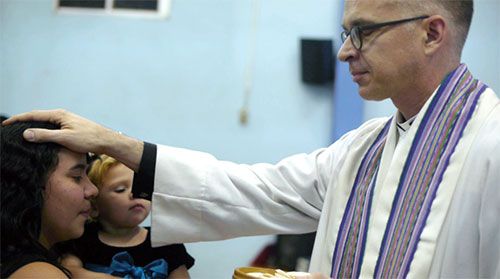
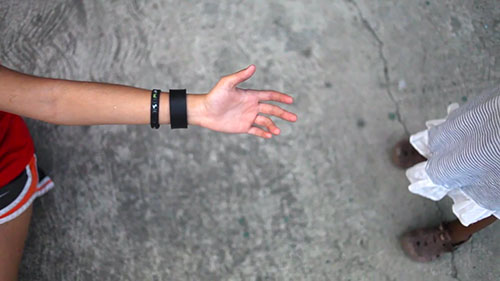
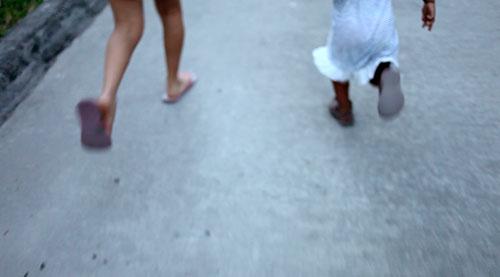
I Will Be a Happy GirlWhen I look up at the sky my world is white. The wind blows the clouds. I want the world to be blue, like the ocean across the street in my imagination. I want my life to be fun like the girls I hear around on the street. My name is long and complicated. I don’t know who gave me my name. I don’t like my name. It is difficult to write. I would like to be a psychologist because I would like to help many people. I do not have brothers or sisters. I have parents but I have not seen them in a long time. When I was six I saw my parents a few times, between one and four in the afternoon. I forgot their names. When I look up at the sky I do not wonder about them. I am going to play and I am going to dance to have some fun with the dark shadows. I will be a happy girl.—Leyli, translated from the Spanish by Spencer Reece
The Shepherd
In the mountains
of Santa Barbara,
he passes time alone.
His sixty-three sheep
are soft like pillows.
They are vulnerable.
Wind blows songs
in his ears, the wind
disappears like seconds
of a clock. His work
is difficult because
he is alone. He is like
Belkis, the tía in our home.
I’m one of those sheep.
—Bianca
Invisible for All My Life
I am an eighteen-year-old girl.
This girl has put up with being invisible all her life.
She didn’t ask to be the happiest woman in the world
but she did ask for someone to take care of her.
She never had the opportunity to have a family,
to receive love which is the only thing she wanted.
I don’t know if I’m in this world with love
or only that they were obligated to bring me into it.
It is awful to know you are a child discarded.
I feel a vacancy in my soul and I don’t know how to fill it.
I know there are people that love me,
but is it true love? Sometimes I wonder, I have had many opportunities to die ...
Why didn’t I die in those moments?
This life doesn’t make much sense if there is no love!
—Paola, translated from the Spanish by Spencer Reece
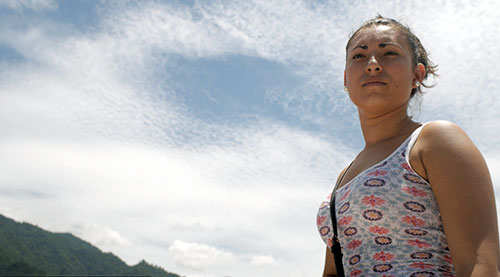
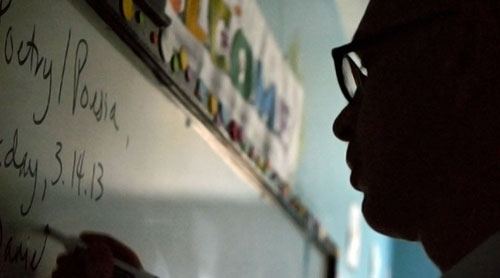
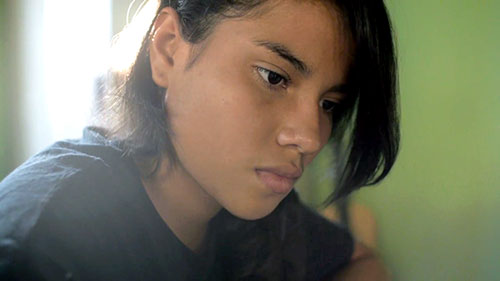
I Was Six Years Old
We live in a world that’s full of hate. I live in Pequeñas Rosas in Honduras, that is why I am close to El Bordo. El Bordo is one of the most dangerous places because they kill you, attack women, and follow you when you aren’t looking.My name is Katherine and I am fifteen years old. My mother is dead and I never knew my father. At the age of six, I came here. I felt I was in paradise, but I missed my family even though I knew this was safer for me.In this place we live behind a giant wall and this May some people are coming to make a grand mural. I would like the mural to be shiny, full of people and happiness. I hope the world will know of my life in this place and that people realize what they have. Do you realize the violence we live in?—Katherine
A Honduran Story
Look at Jennifer and Bryan kiss
at the Church of San Pablo!
The church looks like a toy.
They met in third grade.
Her hands sweat like crazy
because she’s lived in a home
for girls without parents
and she has rarely seen boys.
She gets pregnant,
and they will now marry.
That’s how things go here.
Yes, she looks like a fat frog.
When Jennifer helps Bryan
button his pants at the wedding,
the button flies toward her eye
and Jennifer loses her eyeball.
These things happen here.
Three weeks later, Jennifer asks
for a divorce, she has her son,
and they live under the bridge.
One day her son falls into the river.
The river is the color of a knife
and the river takes him.
I’m telling all of you, if you come here
this could happen to your life.
—Katherine
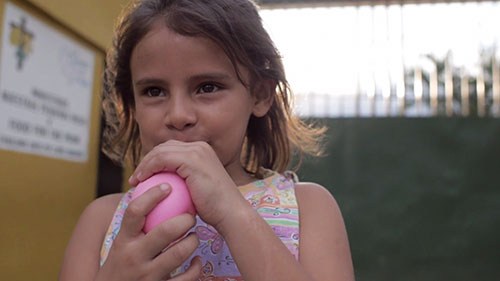
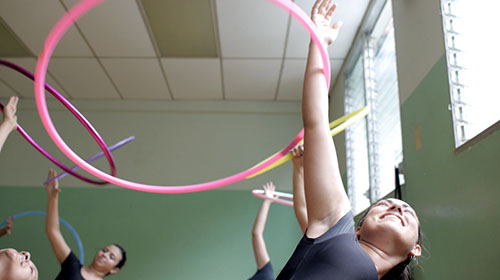
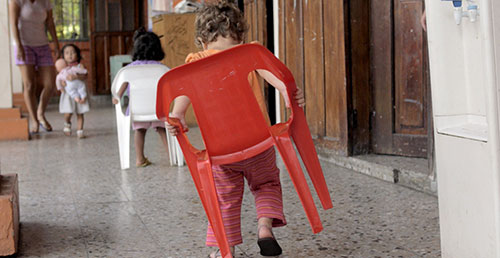
Rose
This young
rose, it represents all of us here.
Careful! It is the prettiest young rose
we have: life needs love,
love needs life.
—Ricci, translated from the Spanish by Spencer Reece
Little Red Hot Lips
Little Red Hot Lips went away, la la!
Off to her beloved grandmama!
She knew nothing about life at all,
nothing about anything outside the wall.
Little Red Hot Lips went on her way,
dressed in red with lots of hair spray,
packing up her iPod on the way
listening to Rihanna sing “Stay.”
O Little Red Hot Lips, la la la la!
Saw the wolf and he saw her. Ta da!
She did not know he was trouble.
With her soul fragile as a bubble,
her heart went thump-thump-thump
for the black-eyed wolf she met at the dump.
Pobrecita! They found Little Red Hot Lips
with scars and blood on her chest and hips!
Love had not treated her so well.
Honduras, Honduras! It can be a hot hell.
Nothing more dangerous than this:
the black-eyed creature she kissed.
—Ana Ruth
Beauty & the Beast
There once was a girl from Progreso. She was beautiful, had green eyes and long black hair and soft skin. Her skin was soft as cotton. She looked like a model. One day she was working as a waitress in a restaurant named Rico’s. She went to take an order of baleadas from a really handsome guy. He looked like a movie star. He was tall and had brown hair, blue eyes, and his skin was bronze-colored. His voice sounded like a lion. She was carrying her café con leche and stared at him. She was hypnotized. She tripped and fell. He laughed at her and picked her up. He introduced himself and said his name was Fabian. The days passed and they began dating. He brought her flowers and chocolates and took her to Islas de la Bahía. After they knew each other for two months he got on drugs. He became a gang member in Mara-18. He got tattoos and said mean things. He said she was stupid. He did not pay attention to her. He killed a family and went to jail in San Pedro Sula. She went to visit him at the jail and it smelled like piss. They separated but she got pregnant. She went to work in a factory and raised her son whom she named Lloyd. She moved to Islas de la Bahía. She thinks often about love and what the meaning of it is. Sometimes she thinks love is like torture. And sometimes, when she sits at her kitchen table, all alone, she thinks: I don’t have that beast anymore.—Ana Cecilia
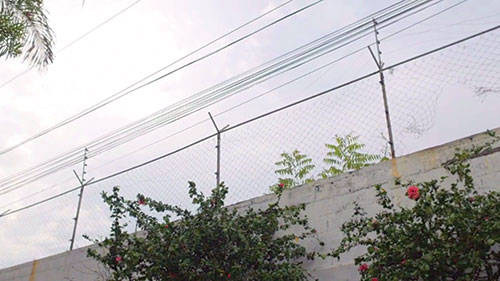
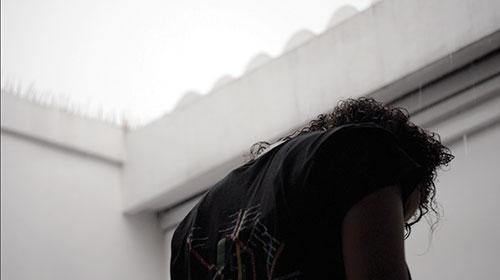
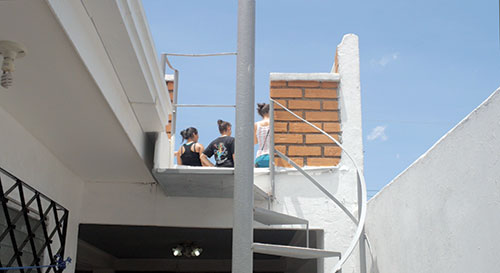
A Prayer for Ilda
Tonight I am in my green room.
Four girls are here with me.
Tonight I think of Ilda, my sponsor.
You were twenty-seven and tall as a palm tree.
Your laugh sounded like the ocean,
it was calm like when little waves tickle the shore.
You loved me and came to visit me once
for three hours under the cancha’s tin roof.
Ilda, I haven’t seen you in ten years.
I wonder where you are in the USA.
You left to find work and cash
for your family. I miss you, Ilda.
My dad told me you came back
to construct an elegant white house.
You didn’t come to see me.
Sometimes I think you forgot me.
This prayer is a house for you.
This prayer is a dinner for you
with pizza, Coke, and ice cream.
Come visit me soon, Ilda.
I will be waiting for you behind the big walls.
Tell Don Julio to let you in.
You will find me in my green room.
—Ismelda
Soon
I am seventeen
and in two months
I will be eighteen.
Soon I am leaving
this place called
Nuestras Pequeñas Rosas.
I left Honduras once.
I went to Philadelphia.
My biggest dream is
to be a flight attendant
in the USA.
I want to explore the world.
This place is my home
and it has meant
everything to me.
What is home for you?
Your school can be your home
even if you don’t have a bed.
Living here has been like
tasting cotton candy:
it is that sweet.
My family is made up
of the people that love
and support me.
I will miss Doña Diana
because she is like a mother
to me. That is the truth.
My real story is a chronicle
of charity. I will never
forget this place I call home.
Honduras, I prefer the visions
of your green mountains.
I am not sure if the world
will love me like in this place.
What will the world
expect from me?
—Anonymous
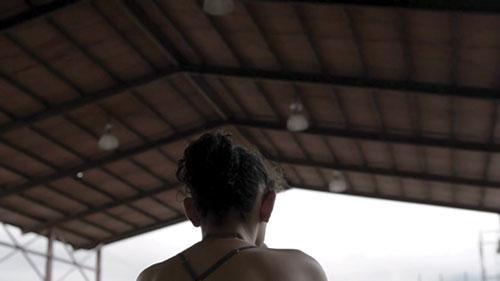
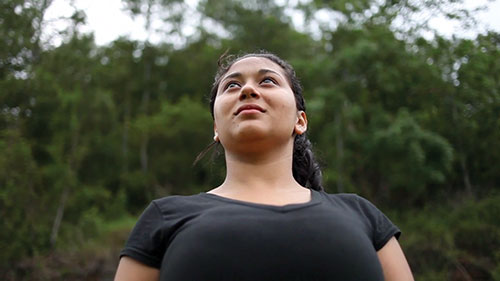
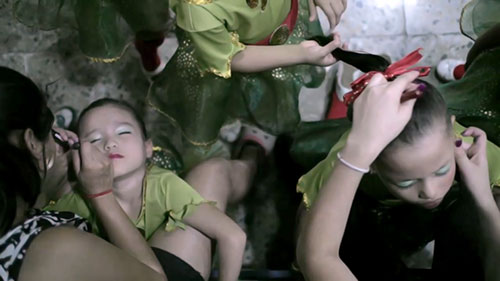
Counting
Every week, every day, every hour, every minute, and every second that I pass without my family it feels like a knife trying to get inside a rock. I am the knife and the rock is my life. So this is me, Aylin, and this is my difficult life without my family. Some people think that living in a home for girls like Our Little Roses is a big blessing. Yes, I say to those people, it is a great blessing but at the same time it is a curse. Every night I start thinking and talking to God in my prayers: “Why, God, why did my family leave me alone?” There is no answer. A lot of people see me with my sisters and my aunt, who is not really my aunt, and they think we are a happy group, but really all of us think the same thing that no one ever says: One day, will our mother come to visit us? It is ugly to know that everyone in this school is celebrating Mother’s Day. On this day, I feel ashamed to be me. But, God, listen to this: I am counting the time like people count the stars and I will keep counting until my mother comes. My sisters are graduating and soon I will go to college, too. When I graduate from college and when I am finally somebody in this world, God, I will go straight to Mexico where my mother lives and I will stare at her like I stare at the stars and with a voice that cracks like thunder I will say: i forgive you! But for now, God, I am here, in Our Little Roses, counting.—Aylin
Invisible for All to See
Para a driver who has worked here twelve sweaty, damp years and was an orphan;
Para the guards, the catrachos, who are like big strong heroes who protect the girls (one is missing an eye);
Para the gangs, who brag about who they kill with their weapons, but sometimes they, too, do good things for their families. Some are also poor, very poor;
Para the teachers who are like books, full of blue wisdom;
Para the students who stroll the hot, hot halls;
Para the women who clean the school behind the serpentine barbed wire;
Para me who lives in this city and who likes this country where they make the best baleadas,
Para you who are reading this poem, we just want to tell you thank you for reading this, it is for all the people who don’t know Honduras.
—The Seventh Grade, with Richard Blanco
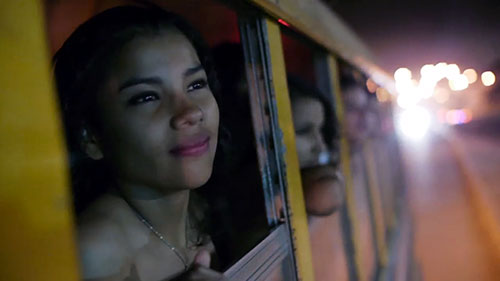
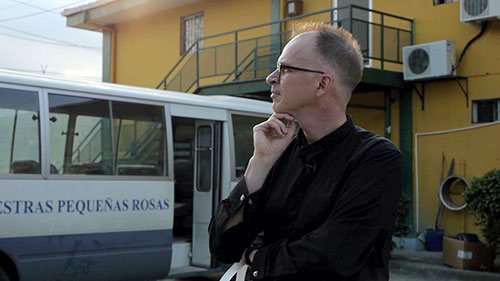
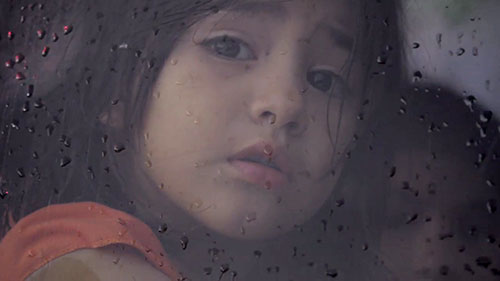
NOTES
Leyli loves reading and would like to be a psychologist. She is seventeen years old.
Bianca is seventeen years old. Her poem was inspired by an adorno figurine of a shepherd and Sylvia Plath’s “Sheep in Fog.”
Paola is nineteen years old and studying to be a hairstylist.
Katherine is sixteen years old. “A Honduran Story” was inspired by stories she had heard of a girl who left Our Little Roses.
Ricci loves to paint and draw. She is fifteen years old.
Ana Ruth is a talented watercolorist. She is sixteen years old.
Ana Cecilia is sixteen years old. Her poem is inspired by a fairy tale.
Ismelda is seventeen years old. Her poem was inspired by an assignment to write prayers for people that had left the country.
Anonymous is nineteen years old. She is bilingual and currently working in San Pedro Sula at a call center.
Aylin is sixteen years old. She has three older sisters and a younger brother.
The Seventh Grade contained fifteen students. They were memorizing Jane Kenyon’s poem “Let Evening Come.”
Born in Hartford, Connecticut, and raised in Minneapolis, poet Spencer Reece is the son of a pathologist and a nurse. He earned a BA at Wesleyan University, an MA at the University of York, an MTS at Harvard Divinity School, and an MDiv at Yale Divinity School. He was ordained in the Episcopal Church in 2011. Reece’s debut collection of poetry, The Clerk’s Tale (2004), was chosen for the Bakeless ...


